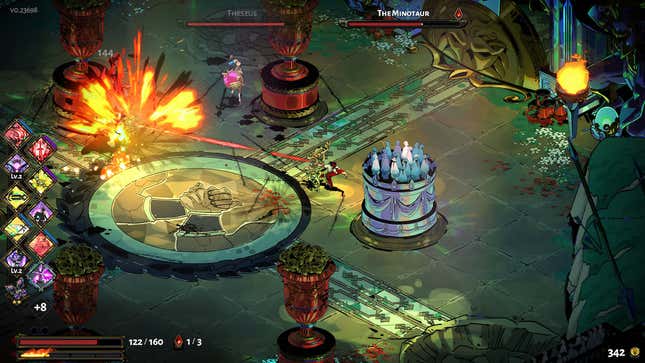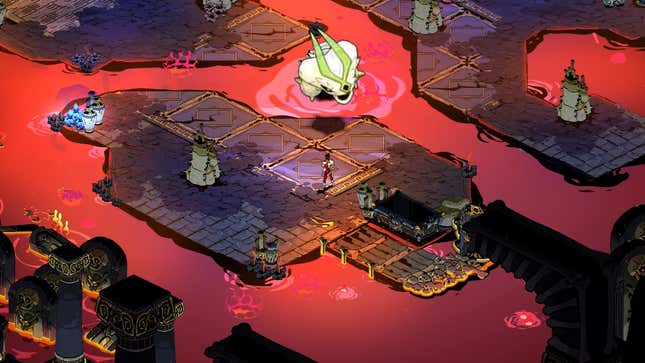
Hades doesn’t really start until you beat it. In many roguelikes, you’re encouraged to play through the game ad infinitum. Hades is no different. Once you beat the final boss (well, for the first time), a new gameplay mechanic opens up, and the game fundamentally changes.


After you take down Hades, you’re soon sent right back to the Underworld, because of story reasons. For all of your runs henceforth, you’re bound to something called the Pact of Punishment, which allows you to modify the gameplay as you see fit, usually in the interest of ramping up the difficulty.
Supergiant’s games have long had a history of allowing for customized difficulty. In Transistor, for instance, as you played, you’d unlock various Limiters. You could then activate them to ramp up the difficulty by tweaking the game to, say, give your enemies shields or restrict how many abilities you could equip. The more Limiters you turned on, the more experience points you’d earn. Bastion, the studio’s first game, had a similar system. The Pact of Punishment fundamentally works along the same lines, but is far more complex and intricate than anything from either of those previous games.
For starters, there are 15 modifiers in the Pact. (Bastion and Transistor each only had 10.) Hades also doesn’t grant you experience points for leveling up in the typical sense. Instead, you can customize the Pact to earn rare resources, which you can then use to unlock various high-level upgrades.
Every modifier increases a gauge: your “heat” level. Easier modifiers kick the heat up by one; tougher ones, by two. On top of that, most of them have multiple levels. If you switch on Calisthenics Program, for example, all of your enemies will get a 15-percent health boost, and your heat will increase to one. But if you kick Calisthenics Program up to the second level, enemies will have 30 percent more health. Your heat, meanwhile, will jump to two.
With every level of heat, you can re-earn all of the prizes—”bounties,” to use in-game parlance—from the boss rooms throughout an escape attempt. Beat the Fury sister (or sisters) in Tartarus, and you’ll get some Titan’s Blood. Defeating Lernie, the Bone Hydra, in Asphodel will give you another diamond. You’ll get another bottle of ambrosia for kicking the daylights out of Asterius, and his scrawny excuse of a sidekick, in Elysium. And, of course, sending bad dad Hades screaming back to his gaudy, ostentatious desk will earn you even more Titan’s Blood.
It sounds like an easy way to milk escape attempts for endless Titan’s Blood, but there’s a catch: You need to clear a run on a certain heat level before earning the bounties of the next heat level. Let’s say you make it to Elysium with the heat on two. Then Asterius tramples you to dust. You can’t turn up the heat to three and expect to reap bounties from Tartarus and Asphodel. You have to escape hell with a heat level of two before earning the bounties from a run with a heat level of three, have to beat it at three before earning them from four, and so on.

Here’s where it gets confusing: For any Underworld areas you’ve already cleared on a heat level you haven’t completed, you won’t re-earn that region’s former bounty. So let’s say, again, that Asterius made a fool of you with the heat on three. (Don’t blame yourself. He’s tough.) When you beat Lernie again, you won’t get another diamond. Instead, you’ll just get a small trove of Darkness. Same goes for the Fury sister(s). This sucks if you’re looking for more diamonds or ambrosia. But on the other hand it’s a good way to mine for extra Darkness—if, somehow, you haven’t unlocked all the skills you want in the Mirror of Night.
Heat is also tied to your weapons. If you use the spear to escape Hades with the heat on three, that doesn’t mean you can use the sword or the shield or the fists to run it on four. You’ll have to start each weapon from a heat level of zero. Remember, by the way, to run through the Underworld again with each weapon and no Pact modifiers. I did not, and discovered that, for five weapons, I had cleared the game on one heat but not on zero heat, meaning, for purposes of irrepressible OCD, I had to go back and play the game five times on a lower difficulty than I was by that point used to. Bothersome!
The easiest modifiers
Extreme Measures: Turning this on makes it so Underworld bosses shift tactics or come with some other game-changer. For instance, in Tartarus, you’ll have to fight all three Fury sisters at once (but you only need to kill one). In Asphodel, the Bone Hydra’s arena is vivisected by streams of lava. These changes definitely throw a wrench in any boss-beating strategy you’ve conditioned, but they only affect one room. If you can get through it, the rest of the Underworld is unchanged.

Calisthenics Program: A 15-percent health boost is barely noticeable. If you have a winning build, you’ll melt enemies in seconds flat anyway. What’s a slightly larger health bar? Calisthenics Program only becomes tough when you increase its level.
Convenience Fee: This one jacks up store prices by 40 percent per level. A 40-percent markup isn’t too bad, honestly, so setting this to the first level is an easy way to turn up the heat. Just think of it like you’re giving Charon the tip he frankly deserves. (Plus, if you need the extra cash, reroll Hermes boons until Side Hustle shows up. Even at the lowest level, you’ll get 10 bonus gold for every chamber you clear.)
Lasting Consequences: Turn this on, and your healing is limited by 25 percent per level. The counter is, simply, to keep a keen eye out for healing items or boons (like Dionysus’ all-healing Strong Drink). Or you could just not get hit. Lasting Consequences will whip you into a dodging pro.
The hardest modifiers
Jury Summons: With each level of this modifier, you’ll fight 20 percent more enemies per chamber. It sounds like nothing, especially considering that most rooms have 10 or fewer enemies, and is handling two more Bone-Rakers that big of a deal? The issue with Jury Summons, though, is that it makes Infernal Troves—the chests you try to ransack by defeating a wave of enemies as quickly as possible—more challenging and less rewarding. Since it naturally takes more time to kill more enemies, and since the treasures in Infernal Troves are doled out by time, you’re bound to reap fewer riches.
Heightened Security: Basically, with this on, if you step on a trap or in Asphodel’s puddles of lava, you die. I’m notoriously careless with traps and lava. Maybe you’re not! Such environmental perils kill me even on standard runs, so I cannot recommend this one in good faith.
Damage Control: In the simplest terms, this one gives your enemies a shield. What, do you actually like dying over and over again and getting reborn in a puddle of blood in your dad’s office? Oh, okay. Carry on.
The point of all this
You might be wondering why in the Hades you’d want to make this game any tougher than it already is. The obvious answer is, again, for the bounties. You’ll need those rewards to really push Hades to its limits. Titan’s Blood is helpful for powering up your weapons, yes, but eventually becomes essential for unlocking their hidden aspects. Ambrosia, meanwhile, seems useless at the start of the game. Later on, you need it to max out your relationships with other characters (which in turn gives you some items you wouldn’t otherwise earn).
There’s also the fun factor. By the time you’ve unlocked the Pact of Punishment, you’ve probably become pretty adept at ransacking the Underworld to oblivion. The Pact’s modifiers serve as a good way to shake things up, keeping the game mechanically interesting long past its expiration date. Hades might seem like a 30- or 40-hour game. With the Pact, you can easily wring twice as much time out of it, and have a blast doing so. Hey, if you’re stuck in the bowels of hell for the rest of forever, why not have a little fun?




